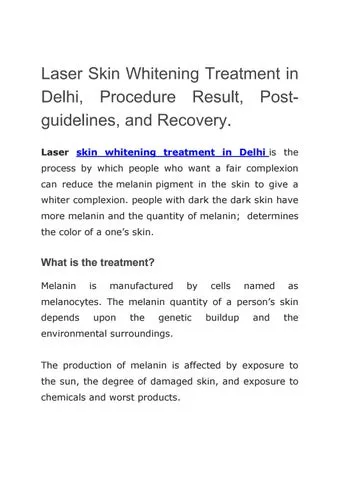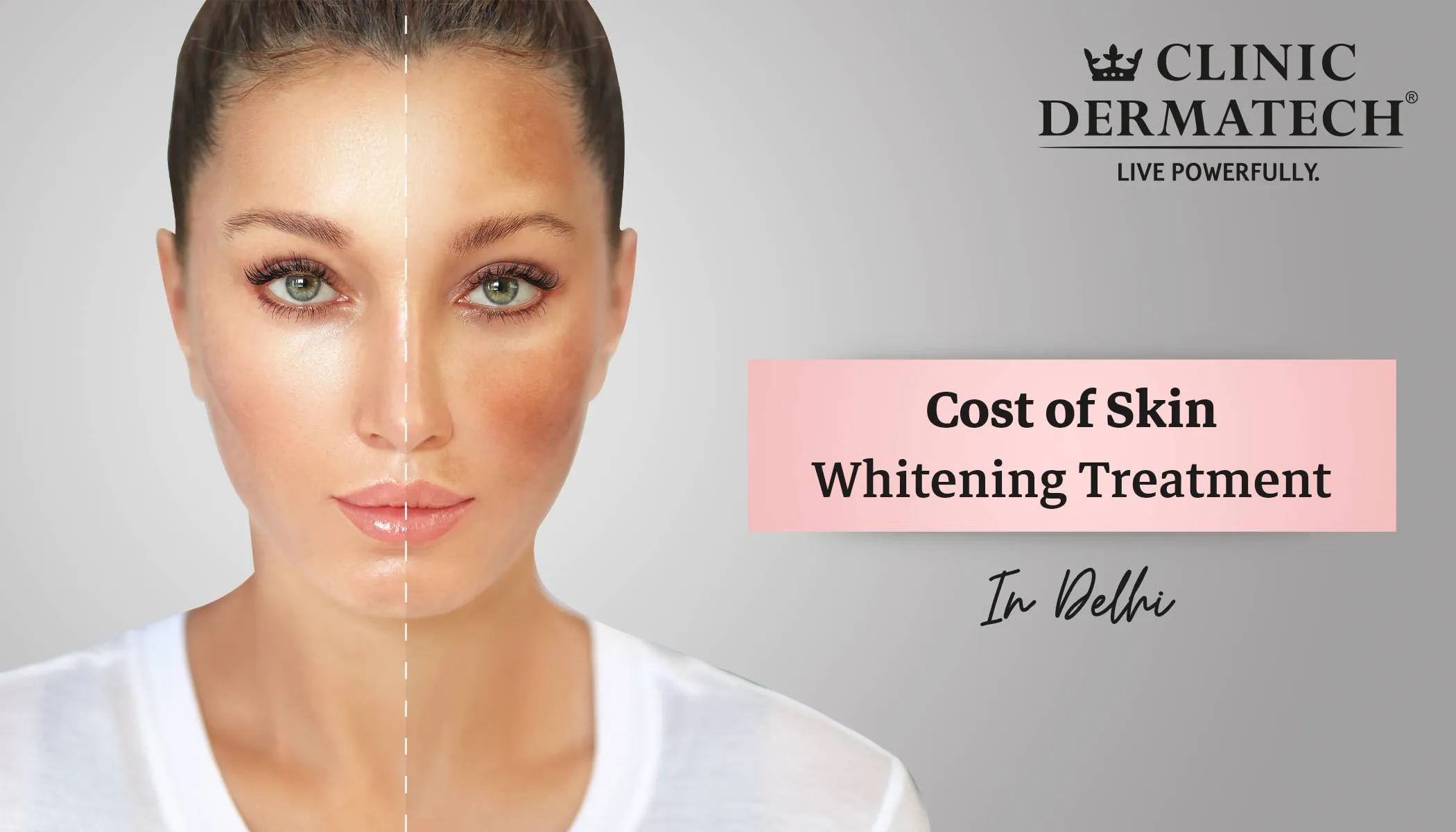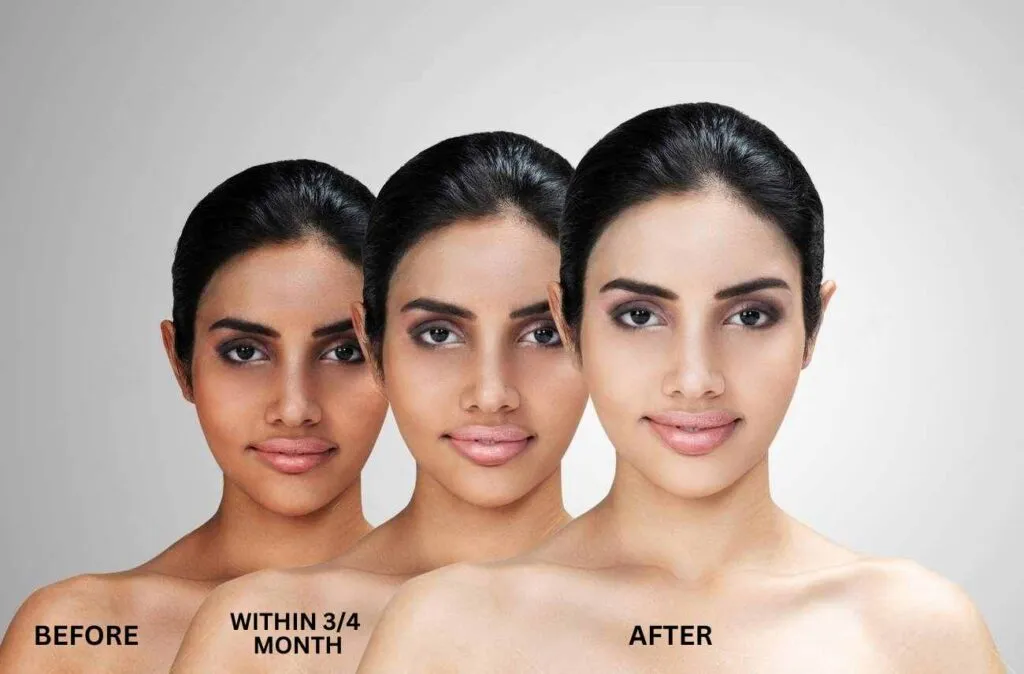Understanding Skin Whitening
Skin whitening, often referred to as skin lightening or bleaching, involves various treatments aimed at reducing the concentration of melanin in the skin. Melanin is the pigment responsible for skin color, and its production is influenced by genetics, sun exposure, and hormonal changes. Skin whitening treatments seek to address issues such as hyperpigmentation, uneven skin tone, dark spots, and overall skin discoloration. It’s important to understand that the effectiveness and suitability of skin whitening procedures vary based on skin type, the underlying cause of pigmentation, and the chosen treatment method. The goal is usually to achieve a brighter and more even complexion while maintaining healthy skin. The choice of treatment depends on several factors, including the severity of the pigmentation and the individual’s skin type, hence the importance of professional consultation.
What is Skin Whitening
Skin whitening encompasses a range of cosmetic procedures and products designed to lighten or even out skin tone. This can involve reducing the amount of melanin, the pigment that gives skin its color, or inhibiting its production. These treatments aim to address concerns like sunspots, age spots, acne scars, and overall uneven pigmentation. The methods used include chemical peels, laser therapies, microdermabrasion, and the application of topical creams containing ingredients like hydroquinone, kojic acid, or vitamin C. The selection of an appropriate skin whitening method requires careful consideration of skin type, the nature and extent of the pigmentation, and the desired outcomes. Consulting with a dermatologist is crucial to determine the most suitable and safe approach for achieving a lighter and more uniform complexion. The best skin whitening treatment in Delhi is not a one-size-fits-all solution, but a personalized approach.
Common Skin Whitening Concerns Addressed

Skin whitening treatments are primarily sought to address a variety of pigmentation-related concerns. These include hyperpigmentation, which manifests as dark patches or spots on the skin often caused by sun damage, hormonal changes, or inflammation. Melasma, characterized by brown or grayish-brown patches, commonly appears on the face and is frequently linked to hormonal fluctuations, especially during pregnancy. Acne scars, which can leave behind persistent dark marks, also drive individuals to seek skin whitening solutions. Furthermore, uneven skin tone, where areas of the skin appear lighter or darker than others, can be improved through these treatments. Age spots or sunspots, which are flat, brown spots that develop due to sun exposure, are another common concern. The effectiveness of treatments depends on the cause and severity of the pigmentation, making professional assessment essential for tailored solutions. The best skin whitening treatment in Delhi will address these different concerns.
Delhi’s Top Skin Whitening Treatments
Delhi offers a wide array of advanced skin whitening treatments, each with specific benefits and suitability depending on individual skin conditions and goals. Among the most popular are laser skin whitening procedures, which target melanin with focused light energy to reduce pigmentation. Chemical peels, using solutions like glycolic acid or trichloroacetic acid, exfoliate the skin to reveal a brighter layer. Microdermabrasion, a non-invasive treatment, exfoliates the skin’s surface using fine crystals, promoting cell turnover and reducing dark spots. Topical creams and serums, often containing ingredients like hydroquinone, retinoids, or vitamin C, are also widely used. The ideal treatment plan usually involves a combination of these methods tailored to each patient’s needs. The best skin whitening treatment in Delhi is often determined after a thorough consultation.
Laser Skin Whitening in Delhi
Laser skin whitening treatments in Delhi utilize advanced laser technology to target melanin and reduce pigmentation. These treatments use specific wavelengths of light to break down the melanin in the skin, thereby reducing the appearance of dark spots, sunspots, and uneven skin tone. Different types of lasers, such as Q-switched lasers and fractional lasers, are used depending on the type and severity of the pigmentation. The procedure involves directing the laser onto the targeted areas, where the light energy is absorbed by the melanin, causing it to shatter and be removed by the body’s natural processes. Laser treatments offer precision and can be effective for various skin types and concerns. However, multiple sessions are often required to achieve optimal results, and it’s important to choose a qualified dermatologist to ensure safe and effective treatment. Post-treatment care includes avoiding sun exposure and using prescribed skincare products.
Chemical Peels for Skin Whitening

Chemical peels are a popular skin whitening treatment in Delhi, involving the application of chemical solutions to exfoliate the skin. These peels come in varying strengths, from mild to deep, with the goal of removing the outermost layers of damaged skin and stimulating the growth of new, evenly pigmented skin. Superficial peels use alpha-hydroxy acids (AHAs) like glycolic acid, while medium peels might use trichloroacetic acid (TCA). The choice of peel depends on the individual’s skin type and the specific pigmentation concerns. The process involves cleansing the skin, applying the chemical solution, and carefully monitoring the skin’s reaction. The treated skin then peels off over several days, revealing a brighter and smoother complexion. Chemical peels can effectively address issues like uneven skin tone, sun damage, and mild acne scars. Post-peel care is crucial and involves avoiding sun exposure and using gentle skincare products.
Microdermabrasion for Skin Whitening
Microdermabrasion is a non-invasive skin whitening treatment widely available in Delhi, offering a gentle exfoliation to improve skin tone and texture. This procedure uses a device to spray fine crystals onto the skin’s surface while simultaneously vacuuming away the exfoliated dead skin cells. This process removes the outermost layer of the skin, promoting cell turnover and revealing a fresh, brighter complexion. Microdermabrasion helps reduce the appearance of dark spots, sun damage, and fine lines, while also improving the absorption of topical skincare products. It’s a relatively quick and painless treatment, making it a popular choice for those seeking a milder approach to skin whitening. Several sessions are often recommended to achieve optimal results. After the treatment, patients typically experience minimal downtime, and the skin may appear slightly pink, which subsides quickly.
Topical Creams and Serums for Skin Whitening
Topical creams and serums are essential components of skin whitening treatments in Delhi, offering accessible and versatile solutions. These products typically contain active ingredients that target melanin production or promote skin cell turnover. Common ingredients include hydroquinone, a powerful skin-lightening agent (often available by prescription), retinoids, which enhance cell turnover and reduce pigmentation, and vitamin C, an antioxidant that brightens the skin and reduces dark spots. Other ingredients like kojic acid, arbutin, and niacinamide are also frequently used. These topical treatments are generally applied daily and can be used alone or in conjunction with other procedures like chemical peels or laser treatments. Consistency and proper application are crucial for achieving noticeable results. The best skin whitening treatment in Delhi often includes a tailored skincare routine using these products.
Choosing the Right Treatment

Selecting the appropriate skin whitening treatment in Delhi depends on several factors, making a professional consultation essential. Skin type plays a crucial role; individuals with sensitive skin may not be suitable candidates for aggressive treatments like deep chemical peels or certain lasers. The underlying cause of the pigmentation is also critical. Different treatments are designed to target specific types of pigmentation, such as sunspots, melasma, or acne scars. The severity of the pigmentation and the desired outcome also influence the choice of treatment. For example, a person seeking subtle lightening might benefit from topical creams or microdermabrasion, whereas significant pigmentation may require laser therapy or chemical peels. It is important to find a dermatologist who will assess your unique skin condition and recommend a customized treatment plan.
Factors to Consider When Choosing a Treatment
Several factors must be considered when selecting a skin whitening treatment in Delhi to ensure both effectiveness and safety. First and foremost is your skin type; those with sensitive skin or specific conditions might need treatments that are gentle. The cause of the pigmentation is also critical, as treatments designed for sunspots might not be suitable for melasma. Your personal expectations and desired results should also be realistic, as achieving a completely flawless complexion is not always possible. The expertise and reputation of the clinic and dermatologist are paramount. Look for board-certified dermatologists with extensive experience in skin whitening procedures. Researching the clinic’s reviews and testimonials can help gauge the quality of service. The cost of the treatment and any potential downtime also need to be considered. Finally, ensure you understand the potential risks and side effects associated with each treatment, as well as the required post-treatment care.
Consultation with a Dermatologist
Consulting with a qualified dermatologist is the first and most crucial step in any skin whitening journey in Delhi. During the consultation, the dermatologist will assess your skin type, evaluate the specific concerns and the underlying causes of the pigmentation. They will also discuss your medical history, lifestyle, and any existing skin conditions or allergies. The dermatologist will then recommend the most appropriate treatment plan tailored to your individual needs and goals. They will explain the procedures, potential risks, expected outcomes, and post-treatment care. You should openly discuss your expectations, any concerns, and ask questions about the treatments. A good consultation involves a thorough skin examination and detailed explanation, ensuring you are well-informed before proceeding. The best skin whitening treatment in Delhi starts with a thorough consultation.
Preparing for Your Skin Whitening Treatment

Proper preparation is key to ensuring the best possible outcomes from your skin whitening treatment in Delhi. The dermatologist will provide specific instructions based on the chosen procedure. Generally, you should avoid sun exposure and tanning beds for at least a few weeks before the treatment, as tanned skin can affect the results and increase the risk of complications. Depending on the treatment, you might need to discontinue certain skincare products or medications. For example, products containing retinol or alpha-hydroxy acids may need to be stopped before chemical peels or laser treatments. Following a healthy skincare routine before the procedure, including gentle cleansing and moisturizing, will keep your skin in good condition. Discuss any health conditions, medications, or allergies with your dermatologist to ensure the treatment is safe. Always follow the dermatologist’s pre-treatment instructions carefully to minimize risks and optimize the outcome.
Post-Treatment Care and Maintenance
Following your skin whitening treatment in Delhi, diligent post-treatment care is essential for optimal results and to minimize potential complications. The dermatologist will provide specific instructions based on the chosen procedure. A crucial aspect of post-treatment care is avoiding direct sun exposure and always using a broad-spectrum sunscreen with a high SPF. This protects the treated skin from further damage and helps prevent pigmentation from returning. Gentle cleansing with mild, non-irritating products is recommended, and avoid harsh scrubs or exfoliants. Depending on the treatment, you might need to use specific creams or ointments prescribed by your dermatologist. It is important to follow the instructions carefully and attend any follow-up appointments to monitor progress. Post-treatment care ensures you get the best results from the best skin whitening treatment in Delhi and maintaining your results long-term.
Skincare Routine After Treatment
Establishing a consistent skincare routine after your skin whitening treatment is crucial for maintaining and enhancing your results. The core components of your routine should include a gentle cleanser to remove impurities without irritating the skin. Apply a broad-spectrum sunscreen with an SPF of 30 or higher daily to protect the skin from harmful UV rays, which can undo the effects of the treatment. Use a moisturizer suitable for your skin type to keep the skin hydrated and healthy. You might incorporate products specifically recommended by your dermatologist, such as those containing ingredients like vitamin C, retinoids, or hydroquinone. These ingredients can help to further lighten the skin, improve texture, and prevent future pigmentation. Be patient, as it can take time to see significant changes. Regular follow-up appointments with your dermatologist are important to monitor progress and adjust your routine as needed.
Maintaining Results Long-Term

Maintaining the results of your skin whitening treatment in Delhi requires a long-term commitment to skincare and lifestyle adjustments. Consistent sun protection is absolutely essential. Always apply a broad-spectrum sunscreen with an SPF of 30 or higher every day, even on cloudy days. Regularly using the skincare products recommended by your dermatologist, such as those containing retinoids, vitamin C, or hydroquinone (if prescribed), can help to keep your skin tone even. Avoid habits that can contribute to pigmentation, such as excessive sun exposure, smoking, and harsh skin treatments. Maintaining a healthy lifestyle, including a balanced diet and adequate hydration, also contributes to overall skin health and can enhance results. Regular follow-up appointments with your dermatologist are important to monitor your progress and to get adjustments to your skincare routine as needed. Remember that consistency is key to keeping your skin bright and even-toned for the long term.
Potential Risks and Side Effects
While skin whitening treatments in Delhi can be effective, it’s important to be aware of potential risks and side effects. Common side effects include redness, swelling, and temporary hyperpigmentation or hypopigmentation. More severe complications can include skin infections, scarring, or allergic reactions. Some treatments, like those involving hydroquinone, can lead to ochronosis, a condition where the skin turns bluish-black. Laser treatments can sometimes cause blistering or changes in skin texture. Chemical peels may result in skin sensitivity or peeling. It is crucial to choose a qualified and experienced dermatologist to minimize these risks. Discuss any potential risks with your dermatologist before undergoing treatment and follow all post-treatment care instructions carefully. Being well-informed and choosing a reputable clinic is key to ensuring a safe and positive experience.
Cost of Skin Whitening Treatments in Delhi
The cost of skin whitening treatments in Delhi varies widely depending on the type of treatment, the clinic, and the expertise of the dermatologist. Generally, more advanced procedures such as laser treatments tend to be more expensive than topical creams or microdermabrasion. The number of sessions needed to achieve desired results also impacts the overall cost. Prices can range from a few thousand rupees for a single session of microdermabrasion or chemical peels, to tens of thousands for multiple sessions of laser therapy. The cost of topical creams and serums will also vary depending on the ingredients and the brand. It’s important to inquire about the full cost during your consultation, including any follow-up appointments or additional treatments. Remember that the lowest price does not always equate to the best value, so prioritize quality, experience, and safety when making your decision. The best skin whitening treatment in Delhi will have a cost that reflects the quality and expertise of the clinic.
Finding a Reputable Clinic

Choosing a reputable clinic is crucial when considering skin whitening treatments in Delhi. Begin by researching clinics and dermatologists, paying attention to their qualifications, experience, and board certifications. Read online reviews and testimonials from previous patients to gauge their satisfaction with the services provided. Check if the clinic uses state-of-the-art equipment and adheres to strict hygiene and safety standards. Schedule consultations with several clinics to assess their approach, discuss your concerns, and get a feel for the staff and environment. Ask questions about the treatments, potential risks, and expected outcomes. Ensure the dermatologist offers a personalized approach tailored to your skin type and goals. Visit the clinic’s website to see the before-and-after photos and any accreditations. The best skin whitening treatment in Delhi will be delivered at a reputable clinic with experienced professionals.
Questions to Ask Your Dermatologist
During your consultation with a dermatologist in Delhi, it is important to ask specific questions to ensure you are making an informed decision about skin whitening treatments. Start by asking about the dermatologist’s qualifications, experience, and the number of treatments they have performed. Inquire about the specific treatment plan they recommend for your skin type and concerns and how the treatment works. Ask about the potential risks, side effects, and expected outcomes of the chosen procedure. Discuss the preparation required before the treatment and the post-treatment care instructions. Inquire about the cost of the treatment, including any additional sessions or follow-up appointments. Ask to see before-and-after photos of previous patients with similar skin concerns. Also, be sure to ask about any alternative treatments and why the recommended treatment is the best option for you. Finally, ask if there is anything else you should know about the treatment or the clinic. The more information you gather, the better you will be to make the right decision.
